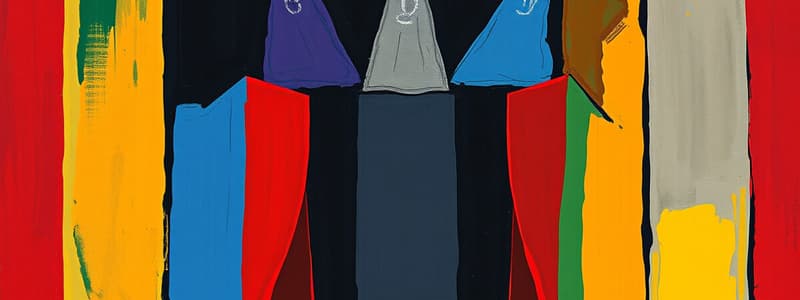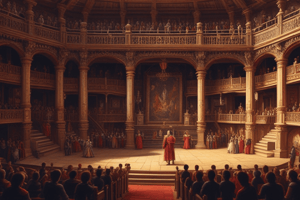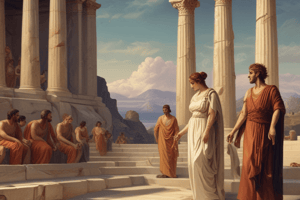Podcast
Questions and Answers
What does the term 'drama' refer to in literature?
What does the term 'drama' refer to in literature?
- A fictional work without a performance component
- A serious storyline involving complex characters
- Any work intended for performance by actors on stage (correct)
- A type of narrative poetry with emotional themes
Which element is NOT essential for bringing a dramatic text to life?
Which element is NOT essential for bringing a dramatic text to life?
- The director who oversees the performance
- The actors interpreting the parts
- The audience who views the performance
- The playwright who composed the text (correct)
How can a set in a play be described when it accurately represents real life?
How can a set in a play be described when it accurately represents real life?
- Minimalist
- Symbolic
- Abstract
- Naturalistic (correct)
What is one of the primary functions of lighting in a play?
What is one of the primary functions of lighting in a play?
What type of set design aims to convey ideas or meanings rather than simply representing reality?
What type of set design aims to convey ideas or meanings rather than simply representing reality?
What effect does a stage set typically have on the audience?
What effect does a stage set typically have on the audience?
Which of the following is NOT a component included in a dramatic work?
Which of the following is NOT a component included in a dramatic work?
What is an important aspect of how plays should be approached when reading?
What is an important aspect of how plays should be approached when reading?
What can lighting indicate within a play beyond just visibility?
What can lighting indicate within a play beyond just visibility?
Which option best describes the role of the director in a play?
Which option best describes the role of the director in a play?
What is a key characteristic of comedy as a genre?
What is a key characteristic of comedy as a genre?
In the Comedy of Manners, what primarily creates the comic effect?
In the Comedy of Manners, what primarily creates the comic effect?
What defines Farce as a subgenre of comedy?
What defines Farce as a subgenre of comedy?
Which of the following is NOT a typical element of a comedy?
Which of the following is NOT a typical element of a comedy?
Which of these elements is often found in both Comedy of Manners and traditional comedy?
Which of these elements is often found in both Comedy of Manners and traditional comedy?
What notable characteristic distinguishes Farce from other comedy types?
What notable characteristic distinguishes Farce from other comedy types?
What is another term for the witty dialogue commonly used in the Comedy of Manners?
What is another term for the witty dialogue commonly used in the Comedy of Manners?
Which playwright is associated with introducing polish and artfulness to Farce?
Which playwright is associated with introducing polish and artfulness to Farce?
What type of humor focuses on the actions of characters rather than their dialogue?
What type of humor focuses on the actions of characters rather than their dialogue?
Which of the following correctly represents a typical plot scenario in comedy?
Which of the following correctly represents a typical plot scenario in comedy?
What is a defining characteristic of operas?
What is a defining characteristic of operas?
Which of the following statements best describes melodramas?
Which of the following statements best describes melodramas?
What is a key difference between opera and musical drama?
What is a key difference between opera and musical drama?
Which element is NOT typically found in operas?
Which element is NOT typically found in operas?
What may indicate that a drama is a melodrama?
What may indicate that a drama is a melodrama?
What is a common subject matter for operas?
What is a common subject matter for operas?
Which of the following is a characteristic of character tropes in melodramas?
Which of the following is a characteristic of character tropes in melodramas?
How do operas typically communicate their narrative?
How do operas typically communicate their narrative?
What emotional tone can be present in the endings of melodramas?
What emotional tone can be present in the endings of melodramas?
What typical feature distinguishes musical dramas from operas?
What typical feature distinguishes musical dramas from operas?
What does the term 'tragedy' literally mean?
What does the term 'tragedy' literally mean?
What role does a tragic hero typically hold in a tragedy?
What role does a tragic hero typically hold in a tragedy?
Which stage of tragedy involves the protagonist realizing their mistake?
Which stage of tragedy involves the protagonist realizing their mistake?
What is the primary emotional response elicited by a tragic hero's downfall?
What is the primary emotional response elicited by a tragic hero's downfall?
Which of the following is NOT a typical stage in the structure of tragedy?
Which of the following is NOT a typical stage in the structure of tragedy?
What does the decline stage in tragedy represent?
What does the decline stage in tragedy represent?
How does a tragic flaw affect the tragic hero?
How does a tragic flaw affect the tragic hero?
What does the term 'dénouement' refer to in a tragedy?
What does the term 'dénouement' refer to in a tragedy?
Why do audiences feel fear when witnessing the downfall of a tragic hero?
Why do audiences feel fear when witnessing the downfall of a tragic hero?
What can be concluded about the endings of tragedies?
What can be concluded about the endings of tragedies?
Flashcards are hidden until you start studying
Study Notes
Understanding Literary Drama
- Dramatic works are intended for stage performances by actors, differing from poetry and fiction primarily in their performative nature.
- Key components of drama include the script (play), actors, director, and audience, each playing a vital role in bringing the performance to life.
- A set represents the action's location, with designs ranging from naturalistic (real life) to symbolic (conveying deeper meaning) using various props and backdrops.
Importance of Stage Elements
- Lighting serves to illuminate the stage and actors and can create mood, indicate time of day, and guide audience focus. It can incorporate effects like strobe and ultraviolet lights.
- Sound effects and music enhance realism and emphasize significant play moments, adding to the overall atmosphere and credibility of the performance.
Types of Literary Drama
- Drama permits live portrayal of written dialogue and action, creating a unique genre distinct from other forms of literature.
Comedy
- Comedy originates from ancient Greek rituals, emphasizing humor as its foundational element, encompassing verbal, behavioral, and situational humor.
- Common comedic traits include:
- Light-hearted tone
- Clever wordplay
- Serious themes presented humorously
- Comical misunderstandings leading to reconciliations
- Happy endings, frequently culminating in weddings.
- Shakespeare’s Much Ado About Nothing exemplifies comedy through witty dialogue and amusing misunderstandings.
Comedy of Manners
- Focuses on societal interactions among gentlemen and ladies, utilizing witty repartee to drive comic effect.
- The plot features a gallant hero, a fop character for ridicule, and morally ambiguous female leads absorbed in fashion.
- Early examples include Shakespeare's works; notable Restoration period pieces include Congreve’s The Way of the World, with a revival in the late 19th to early 20th centuries marked by Oscar Wilde and George Bernard Shaw.
Farce
- A comedic genre designed purely for laughter, characterized by exaggerated characters, ludicrous situations, and physical humor.
- Elements include slapstick, nonsensical storylines, improbable events, and often crude humor.
- Farce has roots in medieval theatre and gained popularity in the 18th and 19th centuries, despite criticism, with an artfully polished approach introduced by Oscar Wilde.
- Modern examples include works by Monty Python and Samuel Beckett’s Waiting for Godot, illustrating absurdity in human existence and relationships.
OPERA
- Operas feature characters singing all dialogue instead of speaking.
- Entire operatic productions are accompanied by a musical score.
- Key components of opera include arias (musical soliloquies) and non-melodic passages that advance the plot.
- Operas are characterized by their librettos, which are set to music and cover tragic, comic, or melodramatic subjects.
- Although dance may be included, operas primarily emphasize singing performances.
- Productions include elaborate set designs and costumes.
- Giacomo Puccini's La Bohème is a renowned opera that tells the tragic story of Rodolfo and Mimi in the context of French Bohemia, unfolding over a year with a memorable musical score.
MELODRAMA
- Melodramas convey serious stories presented in earnest manners.
- Common traits include character archetypes like heroes, heroines, and villains, alongside sweeping romantic tales or serious themes.
- Plots are often grand or depicted in a significant way, regardless of their scale.
- Exaggerated character reactions help to highlight dramatic narratives.
- Melodramas include clear literary themes and showcase flawed characters striving for resolution.
- Endings can mix happiness and disappointment, as demonstrated in Henrik Ibsen's A Doll's House, where Nora's optimistic ending contrasts with Torvald's despair.
MUSICAL DRAMA
- Musical dramas differ from operas despite superficial similarities and are marked by periodic interruptions of the storyline with songs.
- Characters often sing in unison to convey emotions, making songs crucial in changing the plot.
- They can explore dramatic or comedic themes, featuring catchy and distinctive musical scores.
- Singing and dancing play significant roles in the performance.
- Popular musical dramas like Les Misérables and Phantom of the Opera adapt larger literary works, streamlining the narratives and focusing on essential characters and themes through song.
Origins of Tragedy
- Tragedy originated in ancient Greece, linked to festivals honoring Dionysius, the god of wine and revelry.
- The term "tragedy" translates to "goat song," referencing the goat often associated with Dionysius.
- Early tragedies involved ritualistic practices, including human sacrifice.
Definition and Characteristics
- A tragedy typically portrays a serious dramatic narrative with a tragic hero.
- The tragic hero is often a noble or esteemed figure whose misfortunes lead to a significant downfall.
- Emotional responses evoked by tragedy include pity (for the hero's plight) and fear (seeing a noble figure reduced to suffering).
- The hero's tragic flaw is a critical aspect, causing their downfalls, such as hubris or poor judgment.
Stages of Tragedy
- Exposition: Provides essential background information about characters and their situations.
- Development: The tragic hero commits a fateful act that sets off a chain of events leading to their downfall.
- Climax: The protagonist comes to a realization of their grave error.
- Decline: Reflects moral decay and disorder, often leading to catastrophic consequences for the hero.
- Dénouement (Resolution): Concludes with the hero's death and restoration of order.
Elements of Tragedy
- Features a protagonist with a tragic flaw that catalyzes their downfall.
- Situations become uncontrollable, involving serious themes like human suffering and moral decay rather than humor.
- The narrative includes the fall of a previously respected character.
- Ends irredeemably with character deaths, culminating in emotional catharsis.
Notable Example: Othello
- Shakespeare's "Othello" exemplifies tragedy with a cruel villain and a profound sad ending.
- The protagonist, Othello, suffers devastation due to his inability to trust himself and his worthiness of love and happiness.
Studying That Suits You
Use AI to generate personalized quizzes and flashcards to suit your learning preferences.




